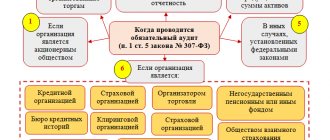Is it possible to fire a pregnant woman?
Work relationships don't always go smoothly. Not all women, having become pregnant, rush to warn management about this, and some unscrupulous employers consider such an employee a burdensome burden. Despite the fact that all maternity benefits are paid not from the organization’s pocket, but by the state, management faces additional troubles. The pregnant woman will have to keep her job, pay for vacations, adjust working conditions and schedule, and look for a person for a temporary position. This also includes paperwork.
It is not surprising that they are trying to get rid of the pregnant woman. Without understanding all the intricacies of the law and considering themselves unpunished, employers try to break the employment contract by any means. Knowing her rights, the expectant mother will not allow this to happen. She is protected by Article 261 of the Labor Code, according to which dismissal is impossible for absolutely all reasons for terminating the contract:
- for absenteeism;
- unsatisfactory performance results;
- committing a disciplinary offense, etc.
In what cases is dismissal legal?
There is an opinion among people that under no circumstances is it possible to separate from a subordinate who is expecting a child. And the interesting position guarantees complete integrity and preservation of all working conditions. This is only partly true. The cases specified in the Labor Code allow terminating a contract with a pregnant woman, and there are sufficient legal grounds. But both parties (subordinate and employer) must comply with certain conditions and know their rights and obligations.
At your own request
The employee has the right to leave work on her own initiative.
To do this, two weeks before the expected date of dismissal, you must write a statement and immediately before leaving, transfer all matters to the replacement employee. The employer makes full financial settlements with the employee, makes a corresponding entry in the work book, and hands over the book itself along with other documents: a copy of the order, pay slip, characteristics, etc. A woman who voluntarily resigns loses the maternity and child care benefits that the company would have provided her.
There should be no problems when showing independent initiative, but there are some nuances here. There are known cases of pregnant women being dismissed at their own request and in accordance with all the rules of the Labor Code, but only on paper. In reality, the woman was under pressure from the employer. By creating unbearable working conditions, he forced the pregnant woman to write a statement and leave her position.
For her part, an unscrupulous employee can also slander the manager: resign on her own, and then write a statement against him to the regulatory authorities, which will be followed by a trial and a large fine. Fearing this, experienced employers are in no hurry to ask an employee to write a personal statement and act in other ways.
By agreement of the parties
The safest decision in this case would be dismissal by agreement of the parties. Then an agreement is reached between the pregnant employee and management. For example, a woman quits, but with compensation. It is not mandatory, but in addition to additional payments, the employee is entitled to:
- wages since the last payment, for all hours not worked;
- compensation for unused vacation, even if this period exceeds 2 years.
The employment contract can be terminated at any time, i.e. the woman will not have to serve the 14-day period. The termination of the employment relationship is evidenced by an agreement signed by both parties. One party initiates, and the other agrees:
- If this is an employee, then she submits an application with a request to terminate cooperation in agreement with the company management.
- When the employer initiates dismissal, he sends the woman a written proposal (where he indicates the date and signs the manager), and she agrees and signs the paper.
Termination is considered legal when both parties knew that the woman was pregnant at the time of signing the agreement. But if, after the employee terminated the contract, she learned about her situation and turned to the employer with a request to cancel the agreement, as a rule, the courts will side with her. Pregnancy is a significant basis for appealing the contract.
Upon liquidation of an organization
If at the time a woman is pregnant, her company (employer, as a legal entity) completely ceases its activities, this is grounds for termination of the employment relationship.
This situation is separately stipulated in the Labor Code. The employer's actions are regulated, and recognition of dismissal is permissible subject to confirmation of the legal basis for termination of the employment contract. The decision to liquidate an enterprise (institution, company, organization, expiration of the individual entrepreneur certificate) must be unconditional, accepted by the owner and documented in writing. A pregnant woman cannot be fired if:
- the owner of the organization has changed;
- there has been a merger, acquisition, division or other reorganization;
- the company has transformed the form of its activities;
- the name was renamed.
When an organization liquidates a branch where a pregnant woman works, her dismissal is also legal. And if the basis for liquidating an enterprise is bankruptcy, it must be proven in court. If all the conditions are met, upon dismissal the woman signs the relevant documents and receives guaranteed monetary compensation.
Under a fixed-term employment contract
Sometimes the employment relationship may be temporary, i.e. be concluded for a certain period. These include seasonal employment, work in an organization created to perform specific work, or replacing an employee who is absent for some reason. When a pregnant woman works under a fixed-term contract, she may be fired, but both the employee and the employer need to know some nuances:
- If the term of a temporary contract expires during pregnancy, the manager is obliged to extend it until the end of pregnancy in accordance with Art. 261 Labor Code.
- The employer has the right to demand from the woman a certificate about her position. She brings documentary evidence once every three months. and less often.
- If a woman occupied the position of an employee who was absent but returned to work (for example, a maternity position), she may be fired. But in the case that in this organization it is not possible to transfer a woman to another position that is feasible for her.
- In the latter case, the employer must offer the woman all available vacancies, regardless of qualifications and salary.
Procedure for dismissal during pregnancy
The most joyful and exciting stage of life, such as pregnancy and the birth of a baby, can be overshadowed by the news of an imminent dismissal. Moreover, this is irreversible if the enterprise ceases its activities. In all other cases, termination of a contract with a pregnant woman is illegal and can be challenged in court. How is dismissal carried out under different circumstances?
At your own request
An expectant mother who has a permanent job has the right to terminate the employment contract at any time. If she does this on her own initiative, then she needs to be warned about her intentions. This should be done two weeks before the expected date of leaving work.
At the same time, the desire to quit must be your own. The manager has no right to put pressure on an employee, forcing her to write a resignation letter on her own.
If an employee is forced to resign against her will through blackmail, pressure, or the creation of unbearable working conditions, then the woman has the right to complain against the employer. To do this, you should contact the State Tax Inspectorate or the prosecutor's office. If the audit shows that the bosses illegally tried to get rid of the subordinate, then they will be punished accordingly.
If the expectant mother was hospitalized before her dismissal, she may not work for 14 days. She goes on sick leave, and the time of forced absence from work is counted towards this two-week period. In this case, there is no need to personally bring the statement to the boss. A pregnant woman can draw it up, and her close relatives will send the document to the employer’s address.
It is necessary that the paper be on the employer’s desk for two weeks. This is necessary if the employee is temporarily undergoing treatment in a medical facility.
During the two-week period that must pass from the date of submission of the resignation letter, the boss may send the subordinate on leave. In this case, the amount of vacation pay during the calculation upon dismissal will be less.
Women in this position have the right to withdraw their resignation letter before the expiration of the specified period - for them this is not fraught with any consequences.
At the initiative of the employer
At the request of the boss, the employee cannot be fired, as this is illegal and threatens punishment.
Dismissal during probationary period
The probationary period is established to check the employee's suitability for his new position.
It is not always used in employment; it is regulated by the Labor Code, but does not have clearly defined deadlines. You can test an employee from one day to 6 months. If the appointed time has expired, the employee is not notified of dismissal, it is considered that he has passed the test successfully. If a pregnant woman is hired for a probationary period, she has no right to be fired; moreover, she should not be given one in principle (when the position is documented).
But there are exceptions. When the boss was not aware of the events, the employee did not report her situation (and, perhaps, did not know herself), upon completion of the probationary period - and unsatisfactory performance results - she may be asked to leave her position. Management declares this in writing three days before the proposed dismissal. However, later the woman can ask to return, having learned about her pregnancy and providing the appropriate certificate. And she must be reinstated.
An employee in this position may be asked to leave her position during a probationary period and in situations such as:
- termination of the organization's activities, liquidation of the enterprise;
- staff reduction;
- by agreement of the parties or the woman’s personal initiative.
How to fire a pregnant employee legally - procedure
If an organization or enterprise is liquidated, all laid-off employees have equal rights, and pregnant employees are no exception (under Article 180, paragraph 2 of the Labor Code of Russia). The procedure for management during liquidation (termination of the activities of an individual entrepreneur) will be as follows:
- Workers are given two months' notice through notices. Employees receive notice from the human resources department about the closure of the enterprise and dismissal. The employee reads the notice, signs and receives one copy in hand.
- Employment contracts are terminated. The pregnant employee agrees in writing to terminate the contract.
- An order is issued to liquidate (close) the enterprise and dismissal of employees. Workers familiarize themselves with the order and sign in the “Acquainted” column.
- Employees are paid wages and compensation.
Oral review of the document is not permitted.
The enterprise (entrepreneur), at the request of the employee, must prepare and issue :
- Copies of production orders on hiring, dismissal, and internal transfers.
- Salary certificate. It is needed to calculate maternity benefits, child care benefits and temporary disability benefits.
- Wages.
- Compensation (for unused vacation).
- Severance pay.
The issuance of certificates and funds must occur on the last day of work (also the day of dismissal).
Is it possible to fire a pregnant woman under the article?
The wording “dismissal under an article” implies termination of an employment contract at the initiative of the employer for the employee committing a disciplinary offense (Article 81 of the Labor Code of the Russian Federation). This also includes the professional incompetence of the new employee. To identify the fact of non-compliance of an employee, he must undergo certification that does not go beyond the scope of his usual work. For control, a special commission is organized, which includes the director of the enterprise, a personnel officer and the immediate superior. Reasons for dismissal under this article include:
- theft and embezzlement of property belonging to the enterprise;
- loss of trust of a financially responsible person (cashier, accountant, etc.);
- failure to perform duties;
- drunkenness;
- tardiness and absenteeism without a valid reason.
A pregnant woman cannot be fired for absenteeism, failure to fulfill her official duties and other violations of labor discipline. But the employer has the right to impose penalties such as a reprimand or reprimand on her. This does not include deprivation of bonuses, although deprivation of bonuses is possible by decision of the manager. The employer records all comments and draws up an absence report from the workplace (if a document or explanatory note about the presence of a valid reason is not provided). The employee is deprived of wages on days of absenteeism.
When can you fire pregnant employees?
The boss cannot take his own initiative and kick the woman out. It's taboo . Circumstances occurring outside his will or desire are considered grounds permitted by law. Also – the initiative of the employee herself.
Liquidation of a legal entity
The procedure for dismissing such employees is regulated by the provisions of Article 180 of the Labor Code of the Russian Federation . If the employer's company is facing liquidation, he is obliged to notify all employees, including the expectant mother, (2 months) Moreover, send out not oral, but written notifications.
When a company is not destroyed, but changes ownership, this is a different situation. The employee must keep her job; she will only have a new boss. If he doesn't want to resign on his own.
A pregnant employee has the following guarantees if the organization where she works is destroyed:
- A severance pay is due, the amount of which is equal to her usual average monthly earnings;
- Payment of compensation for days of unused vacation;
- 2 months receives his salary;
- Receives a paycheck based on the days she worked in the last month.
Her pregnancy benefits will be paid by the Social Security Administration , the local branch, instead of the employer.
Dismissal from a part-time job
Part-time work, in accordance with Article 288 of the Labor Code, is carried out during free time from the main job, but this is work activity on a regular basis.
In this case, the employee is a full-time employee and is subject to all acts of the enterprise. If at a certain point a new employee is hired, for whom this work will be the main one, the previous one is fired at the initiative of the employer. It is he who makes the decision to dismiss a part-time employee, appointing a new permanent employee in his place. What to do when a woman who is expecting a child works part-time? She is protected by the state. As judicial practice shows, disputes between the parties are resolved in favor of the pregnant woman. In this case, Art. 261 of the Labor Code of the Russian Federation overlaps Art. 288. Dismissal made on the basis of the latter is equated to dismissal at the initiative of the employer, which is prohibited by law. Without the consent of the pregnant woman, she cannot be fired from her part-time job. The employer is forced to extend her employment contract.
Termination of an employment contract on the initiative of a pregnant woman or by mutual decision of the parties
It is easiest for a pregnant woman to end her working life if she herself wants it or with an agreement between her and her superiors. A fixed-term or open-ended employment contract can be terminated at any time on the initiative of the expectant mother. The procedure is standard - the employee writes a letter of resignation, the employer agrees with it.
All actions must be carried out by the pregnant woman without any outside influence, since she can sue and not only be reinstated in the service, but also bring her superiors to criminal liability for forced dismissal.
Is it possible to fire a pregnant woman if the contract prohibits pregnancy?
Sometimes, when hired, employees sign a contract that stipulates certain conditions for future work.
But all of them should not contradict current legislation. An employee can sign a document prohibiting pregnancy and her subsequent maternity leave. This condition is classified as an illegal requirement and has no legal force. An employer can respond to a woman’s pregnancy with a fine, dismissal, or separately note in the paper that in the event of an interesting situation for a certain period (for example, 2-3 years), the employee will not be paid for maternity leave. Even if a woman agrees to the conditions put forward and her signature is on the document, she can refute the contract at any time, because it is against the law. If the manager decides to fire a pregnant woman, she can safely file a complaint with the labor commission, which will solve the problem.
An employer does not have the right to demand that a pregnant woman leave her position because of her position.
Absenteeism during pregnancy
The legislation protects the rights of pregnant workers so much that some unscrupulous people consider themselves entitled to take advantage of it. It is clear that pregnancy is a difficult period from all points of view. It may be accompanied by poor health, chronic fatigue, weakness, nausea, etc.
This is also important to know:
Dismissal of the chief accountant
Expectant mothers enjoy such privileges as:
- visiting an antenatal clinic during working hours without loss of wages or risk of dismissal;
- the possibility of not showing up for work due to poor health with impunity;
- changing the work schedule according to a more convenient scenario (shorter shift, transfer to easier work, etc.);
Situations are often made public when an enterprise illegally fired a pregnant woman, thereby violating her rights, and she, with self-esteem, is forced to restore justice in court. Stories about pregnant violators are much less common.
There are special cases when a woman, being pregnant, simply stops showing up at work without explaining the reasons or providing any documents.
In practice, there are examples where such absenteeism lasted from the beginning of pregnancy until childbirth. Then the unscrupulous employee appeared at the enterprise with a child’s birth certificate and an application for leave to care for him. The situation, of course, was outrageous, but the management had no choice but to grant leave according to the law. It is clear that after the end of the specified period, no one will continue to cooperate with such a person.
Using your position as a guarantee against dismissal under any circumstances is not the best solution.
Yes, according to labor law, an employer does not have the right to fire a pregnant woman on his own initiative, but if the case is out of the ordinary, he may well:
- All absences from work should be reflected in the timesheet, thus paying wages only for hours or days worked. Without any documents confirming absence for a valid reason, this method is quite reasonable. If a reason for absenteeism is provided, such as sick leave, naturally, everything will be paid for by recalculation next month.
- To deprive the bonus for such an attitude towards official duties.
- Dismiss such an employee under the article after childbirth and maternity leave.
When skipping work hours, you should not lose sight of the fact that the amount of income during pregnancy, or rather, its average value, directly affects the amount of child care benefits.
What to do if you were fired illegally?
Without sufficient grounds, an employer does not have the right to dismiss a pregnant employee. For this, he can be brought to administrative and even criminal liability, sent to forced labor (from 60 to 360 hours) or get off with a fine:
- in the amount of 1000 to 5000 rubles for officials and individual entrepreneurs;
- from 30,000 to 50,000 rub. for legal entities (the organization itself);
- up to 200,000 rub. or in the amount of income for 18 months.
When a woman’s rights are violated—she was fired illegally or is forced to do so—she can file a lawsuit against the employer for illegal actions. At the same time, she is exempt from paying state fees in court. Also, a pregnant woman whose civil rights have been affected has the right to file a complaint with other government authorities. These include:
- Federal Labor Inspectorate
. This is an organization that successfully resolves a significant part of labor conflicts. - Trade union.
This public association is designed to resolve issues related to their working conditions. - Prosecutor's office.
The application is made in person.
If the case does go to court, the woman’s violated rights will be restored.
The employer must take the pregnant employee back, issue a duplicate work book without a notice of dismissal, compensate her for moral damage (proven) and pay compensation for the time of forced absence (it is calculated based on average earnings). State-guaranteed rights must be respected by both parties. An employed pregnant woman who conscientiously fulfills the duties assigned to her, but does not abuse her rights, is reliably protected by the Labor Code of the Russian Federation. Her dismissal at the initiative of the employer is considered illegal, with the exception of certain cases specified in the Code. Knowing her rights, a worker can not be afraid of losing her job and can work calmly until she goes on maternity leave.









